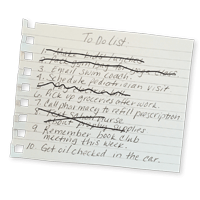Multitasking has become a fact of life, thanks in great part to the blessing and curse of technology. Text messages, emails and ubiquitous Internet access have blurred the lines between work and home life for many people. Add to that the demands of having a bleeding disorder or caring for someone who does, and multitasking can quickly turn into life in extreme hyperdrive.
Balancing all these tasks in a single day may seem impossible, but there are techniques that can help. For example, consolidating errands, exercising and meditating to reduce stress, and pursuing hobbies you enjoy can all help bring more peace to a hectic life. But when stress becomes overwhelming, resulting in ongoing anxiety, recurring illness and sleepless nights, seeking professional help is a wise option.
Recognizing that striving for balance is a skill and an ongoing developmental process, the Virginia Hemophilia Foundation offered a women’s work-life balance workshop during its annual statewide education meeting in June. Led by Lisa Orbé-Austin, PhD, the 90-minute session provided valuable strategies and insights to female caregivers and those with bleeding disorders.
“Work-life balance is about everything in life getting enough attention—including you,” says Orbé-Austin. “When you need to take care of other people, you have to be on top of taking care of yourself.”
Awareness and Priorities
Many women find it difficult to determine how much time to devote to others and to themselves. Because every life is different, there is no one formula that applies to every woman. There are, however, tools to help women make choices that better align with personal priorities.
“It’s important to recognize how you are contributing to being out of balance,” says Orbé-Austin. To discover their priorities, workshop participants wrote a top 10 list of what is most important to them. They assigned how much time they spent on each item during the week. It was an eye-opening exercise for many.
Amy Walker, 37, of Hampton, Virginia, attended the workshop. She has a bleeding disorder, as do two of her four children. During the workshop, she became aware of a priority that had slipped. “My marriage is a priority, but I could see that I was not making enough time to help it grow,” Walker says. “My plan now is to spend less time on social media and to make more time for my husband.”
Many women sacrifice sleep and pay the price later. At the workshop, women brainstormed solutions. Suggestions included avoiding violent TV shows before bed time, and taking a hot bath or shower to relax. Another idea was to use a gentle alarm clock that plays soft music instead of blaring noise that sets an anxious tone for the day ahead.
It’s also important to eat a balanced diet and exercise regularly. You’ll feel more energized throughout the day. In addition, activity can lead to more restful, restorative sleep.
Time Management Tips
 Another component of work-life balance is time management. Orbé-Austin shared a way to make more of your time by using a 25-minute kitchen timer. The Pomodoro Technique® is a time-management tool in which participants allot intervals to each task and then take a 3- to 5-minute break between them. Segmenting tasks into 25-minute blocks of time helped Kelly Cartwright, 47, from York Town, Virginia, get things done more efficiently. She is a chapter board member and has two children, one of whom is an adopted son from China who has hemophilia. “I tried it at work,” says the research psychologist. “I could focus better and more quickly cross things off my list.”
Another component of work-life balance is time management. Orbé-Austin shared a way to make more of your time by using a 25-minute kitchen timer. The Pomodoro Technique® is a time-management tool in which participants allot intervals to each task and then take a 3- to 5-minute break between them. Segmenting tasks into 25-minute blocks of time helped Kelly Cartwright, 47, from York Town, Virginia, get things done more efficiently. She is a chapter board member and has two children, one of whom is an adopted son from China who has hemophilia. “I tried it at work,” says the research psychologist. “I could focus better and more quickly cross things off my list.”
The key to this technique is focusing on one task at a time. Do not multitask—no checking emails, answering the phone or texting while you’re performing each job.
Making It Happen
Kelly Waters, LCSW, MSW, executive director of the Virginia Hemophilia Foundation, heard Orbé-Austin speak at a regional conference. She found the practical skills offered at the presentation useful and worked with staff at the National Hemophilia Foundation (NHF) to bring the speaker to her chapter. “There’s nothing like coming together in one room,” says Waters. “The sharing and learning from each other was very powerful.”
It is NHF’s goal to create more educational materials for women and offer in-person workshops to local and regional chapters, says Kate Nammacher, MPH, NHF director of education. “Expect to see more work-life and other workplace topic materials online in the months ahead,” she says. Those resources promise to help you better balance all the responsibilities you juggle.

